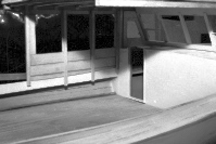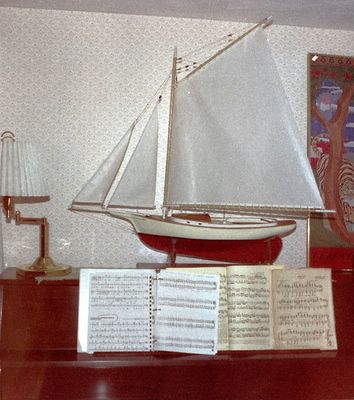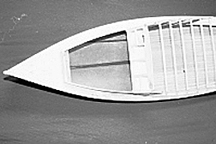
This is a journal of aggregated techniques, photos videos, and plans for Marine Modelers and Model Ship Builders. . My name is DaveMainwaring @ gmail.com. This blog started when I was building a semi-scale Star45 a model based on the International Star. WhyNot build scale, semi-scale static display, radio controlled models powered by Sail, Steam, Electric power for adults and toy boats for kids?
Search This Blog
11/18/2008
11/15/2008
Drum Servo with Jib Tweaker from Dave Ramos
From: David Ramos To: Star45@yahoogroups.com
Sent: Fri, 14 Nov 2008 10:23 am
The following photos show my set up for a drum servo and jib tweaker.
http://www.rcyachts.com/STAR45/P1010084.JPG

http://www.rcyachts.com/STAR45/P1010082.JPG

Main sheet is 2:1 and jib sheet is 1:1
Hope this helps
David Ramos
Chesapeake Performance Models
227 Main Street
Stevensville, MD 21666
david@rcyachts.com
www.rcyachts.com
Sent: Fri, 14 Nov 2008 10:23 am
The following photos show my set up for a drum servo and jib tweaker.
http://www.rcyachts.com/STAR45/P1010084.JPG

http://www.rcyachts.com/STAR45/P1010082.JPG

Main sheet is 2:1 and jib sheet is 1:1
Hope this helps
David Ramos
Chesapeake Performance Models
227 Main Street
Stevensville, MD 21666
david@rcyachts.com
www.rcyachts.com
11/13/2008
The Star 45 R/C Model Sail Boat
The Star 45 R/C Model Sail Boat - Builders Journal
The Star 45 R/C Model Sail Boat - Builders Journal
Construction photographs, articles about the Star 45. -- Join the AMYA STAR45 Class discussion group http://groups.yahoo.com/group/Star45/ -- Read about How To Build A Wooden Star45 R/C Sailing Model! Browse http://woodstar45.blogspot.com/ Based on the International Star Boat this semi-scale Star45 can be scratch built by novice or seasoned skipper. Easily radio controlled and large enough to see out on the water this is a classic model model built by hobbyists for over thirty years!
11/06/2008
1/16 and 1/8 plywood
Boulter Plywood in Summerville, MA carries ( 1/16 ?) and 1/8 okoume plywood for a fraction of the cost of the on line hobby stores.
They also carry Baltic Birch plywood: 1/16'' and 1/8''
http://www.boulterplywood.com
toll free at 888 - 9 LUMBER. (888) - 958 - 6237
or Email: chris@boulterplywood.com
--
Okoume Plywood Information:
1.Face / back: okoume Core: poplar, hardwood, pine ,
2.Size: 1,220 x 2,440mm, 1,250mm x 2,500mm, 915 x 1,830mm or as requested
3.Thickness: 3.5mm-30mm
4.Glue: WBP, MR, E1, E2
--
Wood Properties of Okoume from
http://www.connectedlines.com/wood/wood47.htm
Okoume Alternative Name 1
Gaboon
Okoume Available as Veneer
Yes
Okoume Bending Strength
Moderate
Okoume Blunting of Tool Blades
Moderate to Severe
Okoume Botanical Name
Aucoumea klaineana
Okoume Carving
Average to somewhat difficult to carve
Okoume Clear Finish or Varnish
Fair
Okoume Color of Wood
Pink Brown
Okoume Density
Low
Okoume Drilling
Fair or Satisfactory
Okoume Gluing
Good
Okoume Grain
Mostly Straight
Okoume Hand Tooling
Average
Okoume Hardness
Soft, easy to dent
Okoume Hardwood or Softwood
Hardwood
Okoume Harmful Properties
Non Toxic
Okoume Mortising
Fair or satisfactory
Okoume Nail Holding
Good- Nails are fairly difficult to pull out
Okoume Nailing
Fair - may require pre-drilled pilot hole especially near ends
Okoume Natural Durability
Non-durable
Okoume Polishing
Good
Okoume Sanding
Fair or satisfactory
Okoume Sawing
Moderate cutting resistance
Okoume Screw Holding
Good - Fairly difficult to remove screws
Okoume Screwing
Fair - May require pre-drilled pilot holes especially near ends
Okoume Size of Pores
Insufficient Data Available
Okoume Staining
Fair - May stain unevenly or change colors
Okoume Steam Bending
Poor
Okoume Stiffness
Low
Okoume Surface Preparation for Finishing
No
Okoume Texture of the Wood
Intermediate
Okoume Weight
Light
Okoume Wood Defects
Check (or split,) warp
They also carry Baltic Birch plywood: 1/16'' and 1/8''
http://www.boulterplywood.com
toll free at 888 - 9 LUMBER. (888) - 958 - 6237
or Email: chris@boulterplywood.com
--
Okoume Plywood Information:
1.Face / back: okoume Core: poplar, hardwood, pine ,
2.Size: 1,220 x 2,440mm, 1,250mm x 2,500mm, 915 x 1,830mm or as requested
3.Thickness: 3.5mm-30mm
4.Glue: WBP, MR, E1, E2
--
Wood Properties of Okoume from
http://www.connectedlines.com/wood/wood47.htm
Okoume Alternative Name 1
Gaboon
Okoume Available as Veneer
Yes
Okoume Bending Strength
Moderate
Okoume Blunting of Tool Blades
Moderate to Severe
Okoume Botanical Name
Aucoumea klaineana
Okoume Carving
Average to somewhat difficult to carve
Okoume Clear Finish or Varnish
Fair
Okoume Color of Wood
Pink Brown
Okoume Density
Low
Okoume Drilling
Fair or Satisfactory
Okoume Gluing
Good
Okoume Grain
Mostly Straight
Okoume Hand Tooling
Average
Okoume Hardness
Soft, easy to dent
Okoume Hardwood or Softwood
Hardwood
Okoume Harmful Properties
Non Toxic
Okoume Mortising
Fair or satisfactory
Okoume Nail Holding
Good- Nails are fairly difficult to pull out
Okoume Nailing
Fair - may require pre-drilled pilot hole especially near ends
Okoume Natural Durability
Non-durable
Okoume Polishing
Good
Okoume Sanding
Fair or satisfactory
Okoume Sawing
Moderate cutting resistance
Okoume Screw Holding
Good - Fairly difficult to remove screws
Okoume Screwing
Fair - May require pre-drilled pilot holes especially near ends
Okoume Size of Pores
Insufficient Data Available
Okoume Staining
Fair - May stain unevenly or change colors
Okoume Steam Bending
Poor
Okoume Stiffness
Low
Okoume Surface Preparation for Finishing
No
Okoume Texture of the Wood
Intermediate
Okoume Weight
Light
Okoume Wood Defects
Check (or split,) warp
11/01/2008
R/C model Friendship Sloop
Pemiquid style Friendship Sloop R/C ,model
Friendship Sloop - Pemiquid
Jonesport model under construction, , 42 inch glass hull

42in_lb_model_10.jpg
Posted by target='ext'>Hello

42in_lb_model_03.jpg
Posted by Hello
Dave Mainwaring, 42 inch model under construction
Fibre Glast Developments _ Estimating Materials
The Fundamentals of Fiberglass - Fibre Glast Developments: "Worksheet For Estimating Materials
1) Begin by calculating the surface area of the project. Estimate irregular shapes by measuring the approximate sized rectangles necessary to contain the tapered areas. Multiply the length times the width for each rectangle, and then add all of individual rectangles together to get the total surface area of the part. If the calculation is in square feet, divide by 9 to get square yards.
2) Make a list of each type of reinforcement being considered for the lamination. Multiply the square yards calculated above times the ounce weight of the fabric. This is the total weight of one layer of that material. It is also the amount of resin required to saturate it. When this is known for two or three different types of materials, it is possible to calculate the weight and cost of a laminate constructed from any combination of these fabrics. To convert the ounce weight to pounds, divide by 16. Those inexperienced in saturating fiberglass tend to use far too much resin. A well saturated laminate is uniformly translucent, without milky appearing dry spots, but for the sake of weight and cost, has little excess resin in it."
1) Begin by calculating the surface area of the project. Estimate irregular shapes by measuring the approximate sized rectangles necessary to contain the tapered areas. Multiply the length times the width for each rectangle, and then add all of individual rectangles together to get the total surface area of the part. If the calculation is in square feet, divide by 9 to get square yards.
2) Make a list of each type of reinforcement being considered for the lamination. Multiply the square yards calculated above times the ounce weight of the fabric. This is the total weight of one layer of that material. It is also the amount of resin required to saturate it. When this is known for two or three different types of materials, it is possible to calculate the weight and cost of a laminate constructed from any combination of these fabrics. To convert the ounce weight to pounds, divide by 16. Those inexperienced in saturating fiberglass tend to use far too much resin. A well saturated laminate is uniformly translucent, without milky appearing dry spots, but for the sake of weight and cost, has little excess resin in it."
The Fundamentals of Fiberglass - Fibre Glass Developments
The Fundamentals of Fiberglass - Fibre Glass Developments: "Estimating Material Weights And Cost
Accurate material estimates are necessary for two reasons.First, they obviously are needed for proper ordering, material stocking, and bidding of projects. More importantly though, estimates offer the opportunity to calculate the weight or cost of the part using a variety of laminating schedules before beginning to build.
Unlike estimating coverage when painting, resin usage will vary depending on the type of reinforcement being used. The heavier the fabric, the more resin it will take to wet it out. A good hand laminate consists of about 50% fabric and 50% resin by weight. For example, if an application requires 3 sq yds of a 4 oz/sq yd fabric (total fabric weight = 12 ounces), 12 oz of resin will also be needed. However, if 3 yards of 10 oz/sq yd fabric is chosen (total fabric weight = 30 ounces), 30 oz. of resin will be needed.
Glass mat requires a minimum of 2 ounces of resin for each ounce of mat. Therefore, it the application calls for 20 sq feet of 1-1/2 oz/sq ft mat, it will require a minimum of 60 ounces of resin. Remember that mat is specified in ounces per square foot, where fabrics are specified in ounces per square yard. 1-1/2 oz/ sq ft chopped mat actually weighs 13.5 oz/ sq yd!
Since there are so many possible combinations of materials, one should calculate the weight and cost of a single layer using a variety of reinforcements. These can then be added or subtracted form the theoretical laminate until the design properties are achieved."
Accurate material estimates are necessary for two reasons.First, they obviously are needed for proper ordering, material stocking, and bidding of projects. More importantly though, estimates offer the opportunity to calculate the weight or cost of the part using a variety of laminating schedules before beginning to build.
Unlike estimating coverage when painting, resin usage will vary depending on the type of reinforcement being used. The heavier the fabric, the more resin it will take to wet it out. A good hand laminate consists of about 50% fabric and 50% resin by weight. For example, if an application requires 3 sq yds of a 4 oz/sq yd fabric (total fabric weight = 12 ounces), 12 oz of resin will also be needed. However, if 3 yards of 10 oz/sq yd fabric is chosen (total fabric weight = 30 ounces), 30 oz. of resin will be needed.
Glass mat requires a minimum of 2 ounces of resin for each ounce of mat. Therefore, it the application calls for 20 sq feet of 1-1/2 oz/sq ft mat, it will require a minimum of 60 ounces of resin. Remember that mat is specified in ounces per square foot, where fabrics are specified in ounces per square yard. 1-1/2 oz/ sq ft chopped mat actually weighs 13.5 oz/ sq yd!
Since there are so many possible combinations of materials, one should calculate the weight and cost of a single layer using a variety of reinforcements. These can then be added or subtracted form the theoretical laminate until the design properties are achieved."
Subscribe to:
Comments (Atom)




